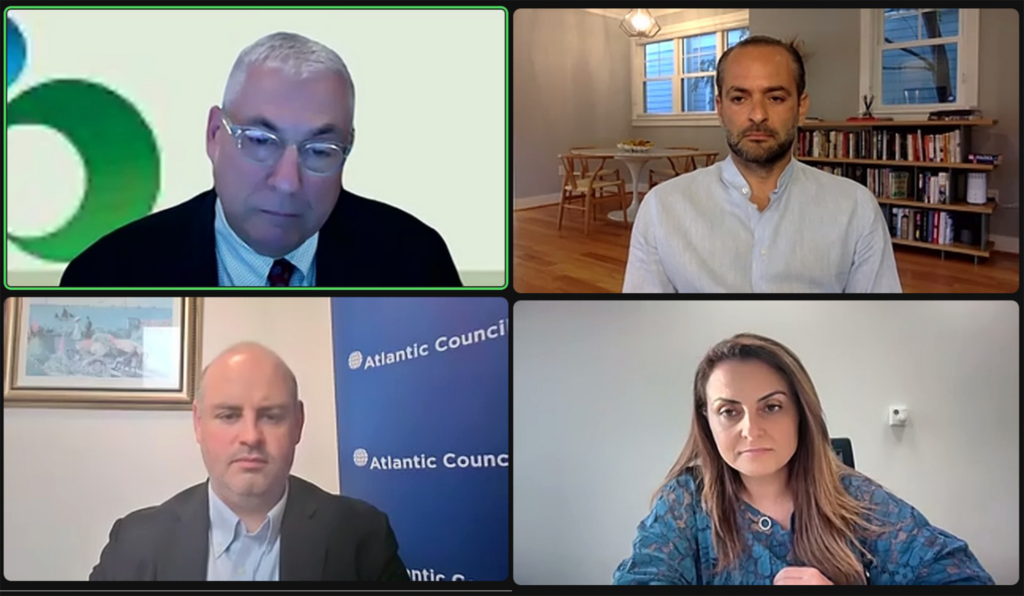
Bottom Left to Right: Jonathan Panikoff, Director of the Scowcroft Middle East Security Initiative, Atlantic Council; Mina Al-Oraibi, Editor-in-Chief, The National.
On Friday, 27 October 2023, the U.S.-U.A.E. Business Council hosted a webinar on the regional implications of the conflict in Gaza. This conversation, held under Chatham House rules, analyzed the U.A.E.’s response to the conflict, which has included supplying aid to mitigate the humanitarian crisis in Gaza and calling for a ceasefire from the position of its rotating seat on the United Nations Security Council. Discussion also detailed attempts by the United States to balance support to its ally Israel while also protecting civilians in Gaza. Panelists also described the possible further expansion of the war to the Lebanese and Syrian fronts, and the role of Iran in influencing proxies and non-state actors in the region.
One panelist described the reaction on the ground in the U.A.E., stating that “everyone, from all backgrounds, seems touched by the conflict.” The panelist discussed the U.A.E.’s “Mercy for Gaza” campaign to provide humanitarian relief to the people of Gaza. The panelist explained that the U.A.E.’s current position on the U.N. Security Council is strategic and nuanced, highlighting H.E. Reem Al Hashimy’s recent statements condemning Hamas’s “barbaric” actions in Israel and calling for a ceasefire, the release of hostages, and humanitarian aid to be allowed into the Gaza Strip. This is in keeping with the U.A.E.’s belief that security, stability, and peace are important to the region’s prosperity.
Another panelist discussed the likelihood that this conflict could expand to other regional states and non-state actors including in Lebanon and the West Bank. Hezbollah is not necessarily “itching for a fight”, in the panelist’s opinion, and the escalation on the Lebanese front is meant to distract, harass, and divert Israeli military resources from Gaza. However, Iran and Hezbollah will have difficult choices to make whether or not to support Hamas if it loses significant ground against an Israeli incursion. There is an opportunity for Arab states in the region to work together to “fill a vacuum” in mediating the conflict in Gaza.
A third panelist described the perspective from Washington, D.C., especially the U.S. diplomatic role in trying to guide and moderate Israeli Prime Minister Benjamin Netanyahu’s responses. In this panelist’s view, the United States is attempting to give Israel time to think through the strategic impact of a ground invasion of Gaza, and to encourage the flow of critical humanitarian aid into the strip.
The speakers also discussed the consequences of the war to the great strides made toward more regional integration in recent years through initiatives such as I2U2 and the India – Middle East – Europe Economic Corridor (IMEC) that were made possible by the Abraham Accords. Such initiatives, they expressed, will still be on the table in the long term, but likely will face no new movement in the short term. One panelist stated that the “behind the scenes commercial and business relationships are what keep things going” in the Middle East. Looking at the U.A.E. in particular, which is home to a significant population of both Palestinians and Israelis, the “people to people ties” are key to creating better regional integration and better futures for everyone.
For questions about this event, please contact Alyssa Kristeller at akristeller@usuaebusiness.org.
